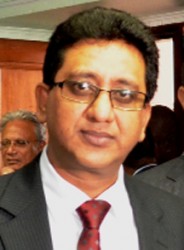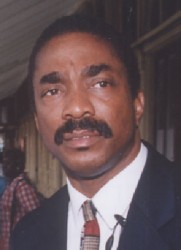In response to the opposition PPP/C’s challenge to APNU+AFC technocrat ministers Winston Felix and Keith Scott sitting in the National Assembly, Attorney General (AG) Basil Williams has argued that the High Court has no jurisdiction to hear the matter which was filed by motion and not by an election petition.

At the presentation of preliminary arguments before Acting Chief Justice Ian Chang, Williams and former AG Anil Nandlall clashed yesterday as they presented varying positions on the issue.
Williams premised his submissions on the basis that the opposition’s application for redress on the issue by way of a motion before the court, is an affront to strict statutory provisions, which he says clearly provides for such matters to be ventilated via an election petition.
Referring to a number of case-law authorities and constitutional provisions, Williams said that since the matter is one which touches and concerns Felix and Scott as elected members of the National Assembly and the PPP’s contention of their validity as sitting members of parliament (MPs), then the PPP must move by way of an election petition and not a motion.
Williams noted that the PPP has filed an election petition and that these issues should be dealt with, therein.
The opposition’s position since the May 11 general elections is that it has been robbed of votes through a carefully planned rigging process on the part of the APNU+AFC coalition. Local and international observers have declared the polls free and fair.
Acknowledging that his party has filed an election petition, Nandlall argued in response, that the PPP/C’s contention in the instant case, has nothing to do with the substantive elections nor the “election” of Felix and Scott as members of the National Assembly, but rather with their “selection” as technocrat ministers.

Williams advanced articles 71 and 163 as being among the constitutional provisions which stipulate that complaints such as those outlined by the PPP are to be dealt with by an election petition and not a motion. as Nandlall has produced.
Williams said the law is “very clear” on such issues and that challenging the validity of elections, the allocation of seats, seats for MPs and the like, must be done by way of an election petition.
He said election petitions are provided for by statute, and covered by very strict jurisdiction.
“Statute provides that such matters be dealt with by elections petitions and not a motion,” the AG emphasised.
Nandlall however submitted that Williams has “misconstrued” the opposition’s application.
The former AG said that in the instant case, he is not challenging the elections, nor the election of Felix and Scott as MPs. Nandlall agreed with Williams that if he were so doing, then he would be statutorily confined and would had to have made his application via an election petition and not a motion.
“I am not challenging their election to the National Assembly. They have been properly elected, but wrongly selected to sit as technocratic ministers. This, I think, has eluded my friend. I am challenging the selection and not the election of the two persons,” Nandlall said.
He submitted that, “The error is made when you put them to sit as technocratic members and not as elected members, for which they have been rightly elected.”
The former AG argued that the challenge he has advanced can be brought by motion.
Williams however contended that Nandlall was questioning the right of Felix and Scott to sit as members of the National Assembly and that insofar as he is questioning that right, the procedure he must adopt is to go to the court’s exclusive jurisdiction as regards matters arising from the elections by way of petition.
The AG emphasised that as part of his preliminary point, it must be stated that the court has no jurisdiction to proceed with Nandlall’s application since it has not come by way of an election petition but rather by motion which the court has no jurisdiction to hear.
Nandlall refuted Williams’ position, stating that since Felix and Scott appeared on the list of candidates at the May 11 polls and were elected as members of that list but not selected by the head of the list, “they cannot now be selected as technocrat ministers.”
He advanced that an election petition is a “very narrow and confined process,” in which one can only challenge elections and persons’ election to the national assembly by way of an elections petition.
Nandlall said further that had he challenged his contention by way of an election petition, he would have been “wrong” since he is not challenging their election, but their selection.
The motion to bar Felix and Scott from sitting in the National Assembly unless their names are extracted from their coalition’s list is being sought by PPP member Desmond Morian.
In his motion filed by Nandlall, Morian is seeking a declaration that Felix and Scott are not lawful members of the National Assembly and an order that they be prevented from sitting in the assembly unless their names are extracted from the coalition’s list.
Felix, the Minister of Citizenship and Scott, Minister in the Ministry of Communities are sitting in the National Assembly as technocrat members of the Assembly. The opposition has however challenged this.
The matter has been adjourned to August 13 at 1pm for further arguments.
On June 10, the first day of the sitting of the 11th Parliament, the PPP/C had called on Clerk of the National Assembly Sherlock Isaacs to not have the oath administered to the duo as their presence as technocrats violated several principles of the constitution.
The AG and the Speaker of the National Assembly have been named as respondents.





